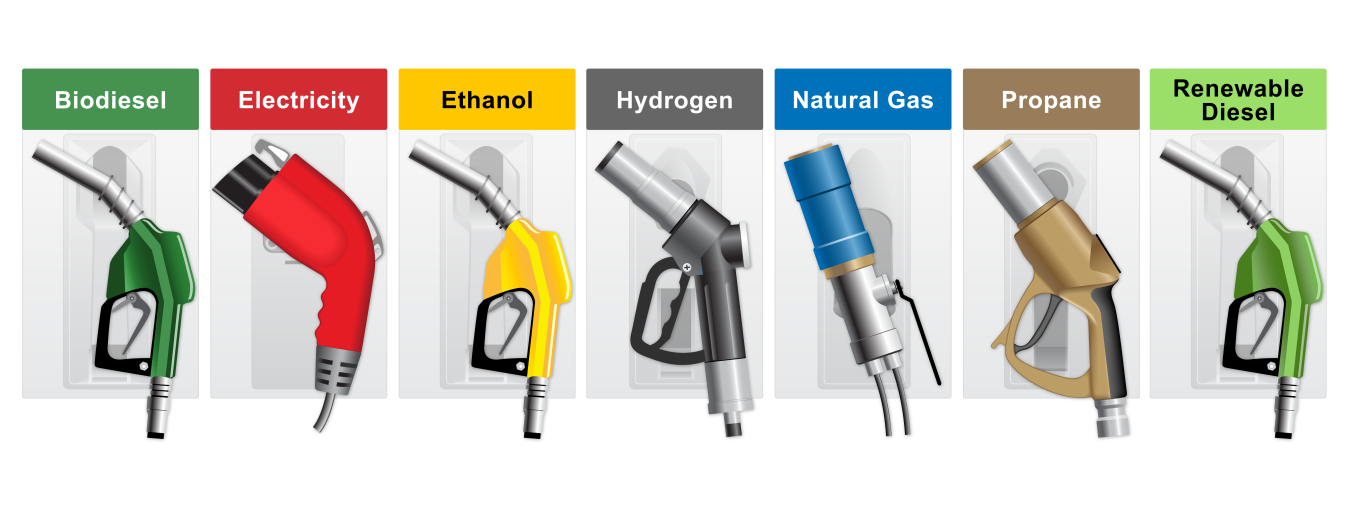Alternative fuel vehicle (AFV) technologies can help federal fleets meet statutory requirements for fleet management, including increasing alternative fuel use. The U.S. Department of Energy (DOE) Federal Energy Management Program (FEMP) and Vehicle Technologies Program provide information on alternative fuel types and fueling infrastructure planning.
Visit FEMP’s Federal Fleet Requirements Resource Center to learn more about the statutory requirements for acquiring, operating, and fueling AFVs.
ON THIS PAGE:
Alternative Fuel Types

- Biodiesel
- Electricity
- Ethanol
- Hydrogen
- Natural Gas
- Propane
- Renewable Diesel
Learn more about each fuel type under Resources.
Alternative Fueling Infrastructure
FEMP helps federal agencies locate, use, and develop alternative fueling infrastructure to fuel AFV fleets. FEMP offers guidance surrounding infrastructure regulations and installation requirements, as well as site-specific planning or assistance in partnering with other organizations to achieve federal fleet management goals.
The Energy Policy Act (EPAct) of 2005 requires that all federal AFVs use alternative fuel 100% of the time unless alternative fuel is not available (i.e., more than three miles from the vehicle’s refueling or garaged location) or is more expensive per gallon than gasoline. In addition, the Energy Independence and Security Act (EISA) of 2007 requires all federal fleet fueling centers to install at least one renewable fuel pump.
FEMP offers data trends on federal use of alternative fuels and vehicles. The data is compiled from reports to the Federal Automotive Statistical Tool (FAST).
Fueling Infrastructure Development Process
Know Your Fleet
Inventory existing AFVs and estimate fuel demand by location. Analyze fleet composition based on mission requirements and frequently traveled routes to identify fleet locations with the highest potential for alternative fuel consumption.
Locate and Use Existing Alternative Fueling Stations
Use online tools available from the Alternative Fuels Data Center (AFDC), including the Alternative Fueling Station Locator, to locate alternative fueling stations. Identify the nearest alternative fueling stations and determine how many of your vehicles could utilize and/or how much fuel you could purchase from each station per year. Use nearby alternative fueling stations as much as possible.
Alternative Fuel Resources
The following resources provide information on alternative fuel types and can assist in the successful implementation of alternative fuels.
Overview:
Visit the Alternative Fuels Data Center for basic biodiesel information, benefits, considerations, station locations, laws and incentives, and more.Resources:
Biodiesel Handling and Use Guide: Guide for handling, blending, distributing, and using biodiesel and biodiesel blends.Overview:
Visit the Alternative Fuels Data Center for basic electricity information, benefits, considerations, station locations, laws and incentives, and more.Resources:
Federal Fleet ZEV Ready Center: Process to help federal fleet and facility managers select and acquire EVs and supporting infrastructure for their fleet.Electric Vehicles for Federal Fleets: Resources, publications, and technical support for fleet managers considering EV technologies and applications.
Overview:
Visit the Alternative Fuels Data Center for basic ethanol information, benefits, considerations, station locations, laws and incentives, and more.Resources:
Handbook for Handling, Storing, and Dispensing E85: Document provides information on ethanol fuel properties, standards, codes, best practices, and equipment information for those who blend, distribute, store, sell, or use E15, E85, and other ethanol blends.Ethanol Fueling Infrastructure Development: Information for fleet managers interested in installing E85 infrastructure.
Overview:
Visit the Alternative Fuels Data Center for basic hydrogen information, benefits, considerations, station locations, laws and incentives, and more.Overview:
Visit the Alternative Fuels Data Center for basic natural gas information, benefits, considerations, station locations, laws and incentives, and more.Resources:
Compressed Natural Gas (CNG) Vehicle Maintenance Facility Modification Handbook: Handbook covers the primary elements that must be considered when developing a CNG vehicle maintenance facility design that will protect against the ignition of natural gas releases. It also discusses specific protocols and training needed to ensure safety.Costs Associated with Compressed Natural Gas Vehicle Fueling Infrastructure: Document to help fleets understand the cost factors associated with fueling infrastructure for CNG vehicles. It provides estimated cost ranges for various sizes and types of CNG fueling stations and an overview of factors that contribute to the total cost of an installed station.
Overview:
Visit the Alternative Fuels Data Center for basic propane information, benefits, considerations, station locations, laws and incentives, and more.Resources:
Costs Associated with Propane Vehicle Fueling Infrastructure: Document to help fleets understand the cost factors associated with propane vehicle fueling infrastructure. It provides an overview of the equipment and processes necessary to develop a propane fueling station and offers estimated cost ranges.Overview:
Visit the Alternative Fuels Data Center for basic renewable diesel information, benefits, considerations, station locations, laws and incentives, and more.

